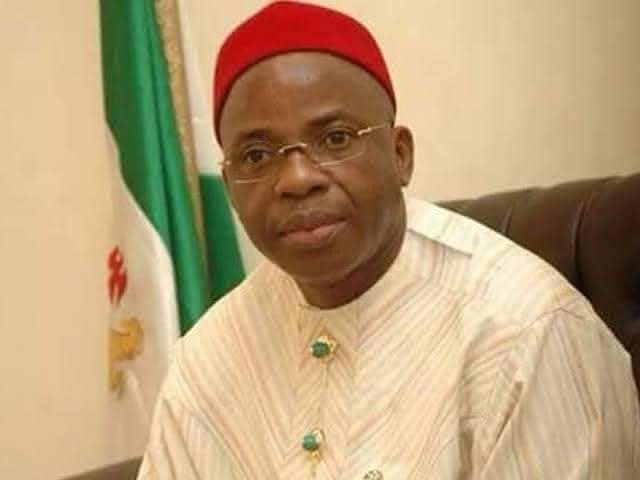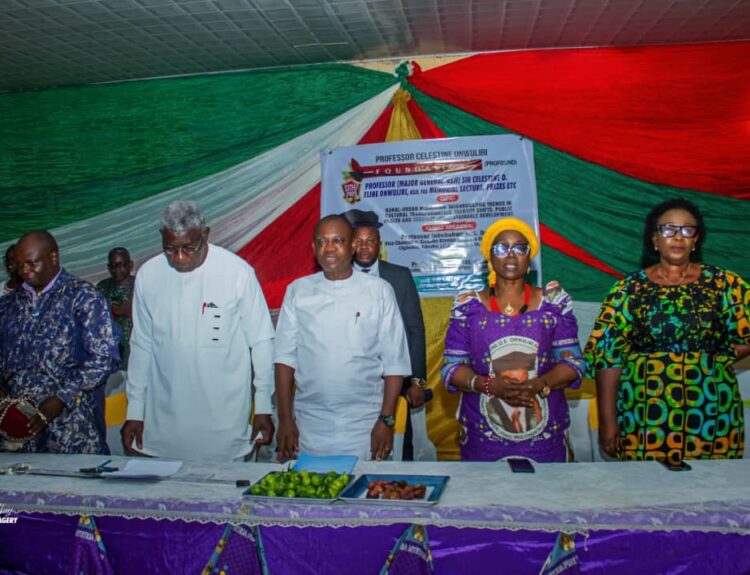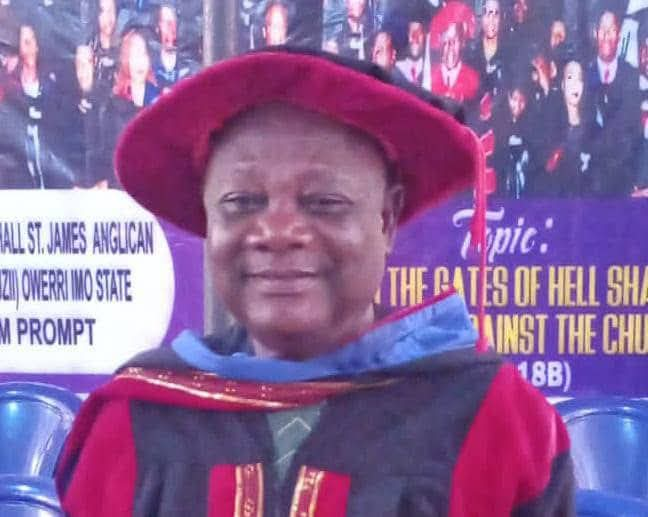By Oruruo Samuel Okechukwu
“Leadership is not about the next election. It’s about the next generation.” — Simon Sinek
On Monday, August 4,2025,Chief Ikedi Godson Ohakim turned 68. For millions across the Igbo heartland – Imo State and beyond, it is more than the passing of another year. Rather, an opportunity to reflect on the impact of a man whose journey in service to the people is with both purpose and poise. In a time when seasoned leadership is often overlooked for trend and noise, Ohakim’s story is a reminder to all of a grounded style of governance, one that combined intellectual ability with impact.
From Okohia to Owerri: A Life Born of Faith
Ikedi Ohakim was not born into privilege, but into a prayer. His parents, Chief and Mrs. Maxwell Nwachukwu Ohakim waited for over ten years, praying, hoping, trusting in God, for the gift of a child. As committed Christians and members of the Assemblies of God Church, they never lost faith. Silent whispers turned to public mockery, still, they remained steadfast, grounded in their faith and implicit confidence on divine providence.
Finally, on the 4th of August, 1957, in the very small community, where many had questioned and even mocked them, their bundle of joy in the person of Ikedi Godson arrived. His birth for everyone in Okohia, Isiala Mbano at the time, was nothing short of a miracle, an emblem of fulfilled hope in a time of silence.
What few outside the family knew was that his birth had actually been prophesied twice. First, at the Aba parish of the Assemblies of God Church after five years of childlessness. The prophecy, unusually specific, asked them to wait five more years. The second prophecy gave not only the assurance of a child but the exact year – 1957, precisely ten years after their marriage.
For Chief Maxwell Ohakim, whose own father had married seven wives, the pressure to take a second wife was immense. But he was firm in his conviction, choosing faith and loyalty to his marital vows, over tradition. What transpired during those trying times would become the bedrock of the values he passed on to his son.
Chief Maxwell and his wife raised him with deep discipline, unwavering honesty, and a devotion to service that became the foundation of his life. Those values would echo later, in boardrooms, negotiations, and even in the governance of a state.
The Boardroom Before the Ballot
Before the numbers and the politics, there was Shakespeare.
As a teenager, his love for literature knows no bound, he committed considerable portions of Julius Caesar and Macbeth to memory, often quoting them with ease decades later. The rhythm of verse, the burden of power, and the tragedies of failed leadership in those plays left a mark. They taught him about power, ambition, honour—and the tragedy that follows when leaders forget these truths.
They shaped not only his thinking—but also the way he approached decisions in boardrooms and, later, in government.
It is a well established fact that Ohakim made a name in corporate Nigeria, he trained and worked across finance, energy, and strategy, beginning with then-powerful International Merchant Bank, followed by firms like FSB International Bank and Altex Group. His strategic insight and execution earned him roles on boards such as Consolidated Hallmark Insurance and Royal Palm Hotels.
As founder of Mekalog Group, he built one of West Africa’s respected brands in marketing, logistics, and oil services. His invitation to serve on Nigeria’s Vision 2010 Committee brought him closer to the country’s developmental blueprint. By the time he entered politics, it was not for relevance—he had already earned it.
The First Spark: Early Public Service
Ikedi Ohakim’s first taste of public service came in the early 1990s, when he was appointed Commissioner for Commerce, Industry, and Tourism under the late Governor Evan Enwerem. It was an eye-popping assignment that allowed him to apply private sector discipline to public policy. He understood that economic growth didn’t just happen, it had to be organised, incentivised, and most importantly, made inclusive.
Years later, his invitation to serve on Nigeria’s Vision 2010 Committee further immersed him in national development planning. That forum, comprising some of Nigeria’s brightest minds, challenged him to think beyond business models, to see governance as an engine for transforming lives.
By the time he entered partisan politics, it wasn’t for relevance, he had already earned that. What drove him was conviction: that experience, properly applied, could rebuild public confidence in leadership.
A Governor with a Blueprint
Ohakim’s election in 2007 was a turning point. Running under the budding, Progressive People Alliance – PPA, he quickly distinguished himself not by lofty campaign promises, but by practical proposals. He brought the clarity of a business executive into the often chaotic realm of politics, and governed with structure, strategy, and result.
And for four years, that was what guided him on every move.
The numbers tell the story: 450 kilometres of roads built or fixed. The Owerri-Orlu-Okigwe triangle finally got the attention it deserved. Over 1,300 water schemes came back to life, Imo Water Corporation revived, giving communities renewed access to potable water. The state raised ₦18.5 billion through bonds, not handouts or federal allocations, but actual financial instruments that investors believed in.
But it wasn’t just about cement and pipelines. Federal Court of Appeal was successfully relocated to Owerri, something previous governors had tried and failed.
His Clean and Green Imo initiative made Owerri one of the cleanest cities in Nigeria, a transformation driven not by slogans but practical blueprint. Public sanitation, tree planting, and urban renewal were rolled out with impressive citizen buy-in. The monthly town hall meetings he held across the state gave people a voice in policy decisions. For the first time, government was not a distant monologue but a living dialogue.
Ohakim’s four years in office cannot be said to be perfect, but those were productive years, that left visible legacies that time has not erased.
A Set Back Not A Defeat
The 2011 election defeat remains one of the most debated events in Imo’s recent history. For many observers, Ohakim didn’t lose due to lack of performance but fell victim to political realignment, misinformation campaigns, and a rising tide of voter fatigue common in transitional democracies.
The defeat painful, but not for the reasons you might think but not for the reasons most might think. It was not even personal, it was about watching years of careful progress get dismissed as irrelevant. The roads he built were still there, the institutions he strengthened were still working, but none of that seemed to matter in the heat of campaign season.
Ohakim took the loss with dignity, which probably surprised his critics. He walked away with grace, letting the people decide, and giving history the room to speak when emotions had settled.
The Comeback Trail
The years that followed were quiet but not idle. As political winds changed, so did public narratives. Allegations were thrown, reputations tested, and his name at times unfairly diminished.
But true to form, Ohakim stayed grounded. He never sought to rewrite the truth with noise; instead, he focused on introspection and self-reinvention.
He returned to classrooms – policy study, economic modelling, and continued civic engagement. By 2019, he re-emerged not as a recycled candidate, but as a redefined one.
2019: The Almost Comeback
Running under the Accord Party, Ohakim’s 2019 campaign surprised many. More people listened. His ideas were focused, his delivery was sharper, and his tone was more connected to grassroots concerns. He spoke of youth employment, of security, of the quiet desperation in rural communities. He came third in a crowded race, proving that relevance, once earned, never truly fades.
The people had not forgotten. And neither had he.
A Leader Still Thinking Forward
Today, as he quietly signals renewed interest in public service, Chief Ohakim speaks a different political language, less about partisanship, more about partnership. His alignment with the All Progressives Congress (APC) isn’t about career preservation; it is, by his own account, about finding the most effective platform to deliver results.
His recent public lectures and policy papers show a man who hasn’t lost his edge. If anything, his ideas have evolved. He talks about digital governance now, about public-private partnerships that actually work, about turning Imo into an entrepreneurial hub.
The projects he started; the Imo Freeway, Wonder Lake Resort, the Clean and Green initiative, were not just good ideas for their time. They were blueprints for the kind of state Imo could still become.
He has not promised miracles, only management. And in today’s Nigeria, that may be miracle enough.
The Gift of Experience
At 68, Chief Ikedi Ohakim offers something very few still active in politics can boast of proven leadership coupled with renewed clarity. He has seen power and loss, progress and delay, admiration and criticism. And yet, his faith in God and belief in service remain unshaken.
He no longer speaks like a man looking for position; he sounds like a man prepared for purpose.
As Chief Ohakim adds another candle to the cake today, thank 4th of August, 2025, we are reminded that birthdays are more than anniversaries. They are mile markers, moments to ask: what have I done with the time, and what is left to do?
For Ikedi Ohakim, the answer is clear. There is still work to do for Imo state, for posterity, and for the promise of a state that has too often been let down.
And perhaps, just perhaps, the greatest gift Imo can give in return is one more opportunity to finish what he started, not out of sentiment, but out of need.
Happy 68th Birthday, Chief Ikedi Ohakim.
May your life continue to bear fruit, and may Imo State one day again benefit from the leadership it once had, and may still need.






